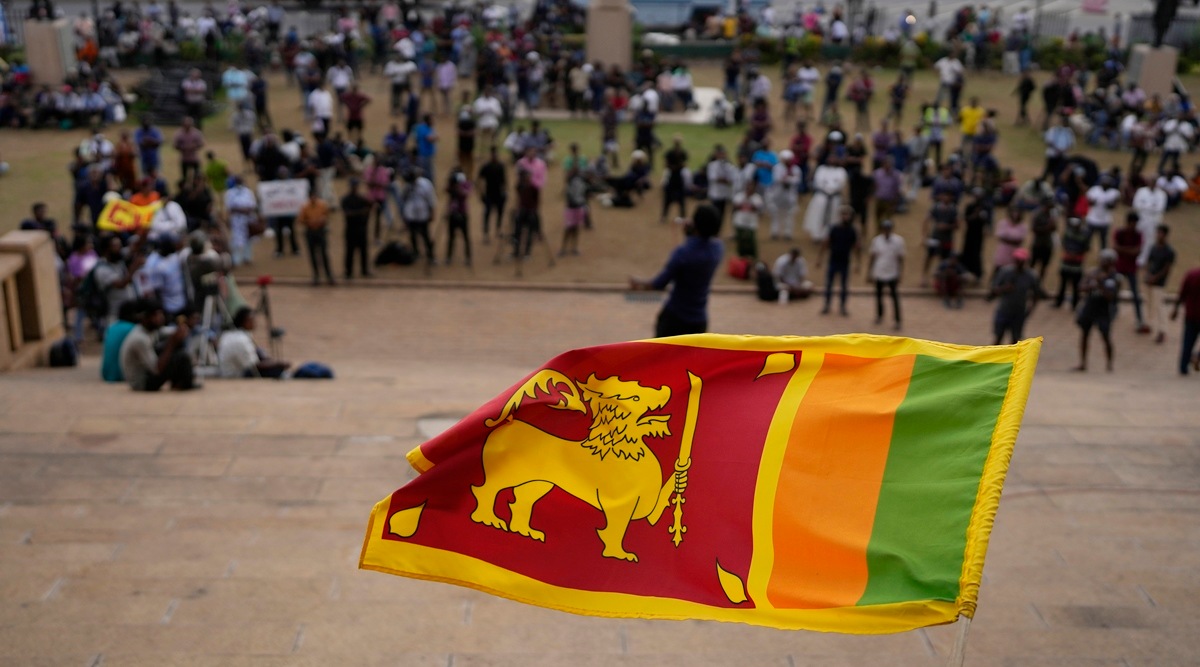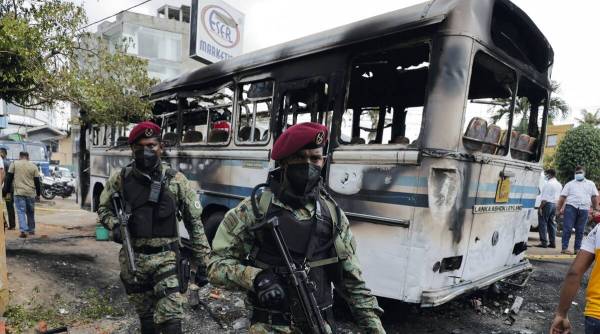 A Sri Lankan flag is waved by a protester demanding elected president Ranil Wickremesinghe step down in Colombo, Sri Lanka, July 20, 2022. (AP)
A Sri Lankan flag is waved by a protester demanding elected president Ranil Wickremesinghe step down in Colombo, Sri Lanka, July 20, 2022. (AP)Sri Lanka Crisis Live: A day after Ranil Wickremesinghe was chosen as the next President of Sri Lanka, anti-government protesters continued to rally against the Rajapaksa ally. Protesters gathered outside the presidential residence, which they had stormed last week, and chanted “Go back, Ranil,” reported news agency PTI.
Addressing the Parliament after his victory, the 73-year-old Wickremesinghe asked the country to move on. “I need not tell you what state our country is in,” he said. “People are not expecting the old politics from us. They expect us to work together. Now that the election is over, we have to end this division,” he added.
Meanwhile, India has said that it will continue to be supportive of the Sri Lankan people’s quest for stability and economic recovery, through democratic means and values, established democratic institutions and constitutional framework. The statement by the Indian High Commission in Colombo comes hours after Sri Lankan Parliament elected Ranil Wickremesinghe as new President to succeed Gotabaya Rajapaksa who fled the country and resigned after a popular uprising against his government for mismanaging the economy. The Indian High Commissioner in Sri Lanka Gopal Baglay said India will help Sri Lanka to make an “early and effective” economic recovery.
 Sri Lankan army commandos walk past a damaged bus after it was set on fire by demonstrators in Colombo, Sri Lanka. (Reuters)
Sri Lankan army commandos walk past a damaged bus after it was set on fire by demonstrators in Colombo, Sri Lanka. (Reuters)

With Ranil Wickremesinghe elected as Sri Lanka's President, senior Congress leader P Chidambaram on Wednesday expressed worry that the turbulence in the island nation may continue and the economic crisis worsen.
"Mr. Ranil Wickremesinghe was as unpopular as the Rajapaksas. The protest movement was directed against him too. I am afraid his election as President of Sri Lanka will not end the protests nor usher in unity and peace," Chidambaram said.
"I am worried that the turbulence in Sri Lanka may continue and the economic crisis worsen," he said. (PTI)
The four suspects who were arrested earlier this month for allegedly torching the private residence of Sri Lanka's newly-elected President Ranil Wickremesinghe were on Wednesday remanded to judicial custody till July 27.
The four suspects who were arrested on July 10, will be produced for an identification parade during the next hearing date on July 27, according to the Daily Mirror newspaper.
Sri Lanka's Central Investigation Department has informed the Colombo Fort Magistrate Thilina Gamage that an individual named Evan Perera, who was wanted for questioning over the incident has fled the country, the report said.
On July 9, in remarkable scenes of a country in meltdown, anti-government protesters set Wickremesinghe's private residence at Cambridge Place on fire. (PTI)
Protesters have demanded the resignation of newly elected president Ranil Wickremesinghe. "He has been elected against the will of the people. The Rajapaksas have brought him in," Father Jeewantha Peiris, a spokesman for the protest group ‘Aragalaya', said, PTI reported. "We will continue our protest campaign until Wickremesinghe resigns,” he stressed. (Photos: AP)
Sri Lankan shares closed higher on Wednesday, hours after the country's lawmakers voted in Ranil Wickremesinghe as the new president.
At the close of trade, the CSE All-Share index was 0.89% higher at 7,712.08.
On the CSE All-Share index, trading volume rose to 82.7 million shares from 66.8 million shares in the previous session. The equity market turnover was 1.34 billion rupees ($3.74 million), up from 1.12 billion rupees in the earlier session, according to exchange data. (Reuters)
The IMF hopes to complete the negotiations with Sri Lanka on a bailout package "as quickly as possible" and the "moment there is a government" in the country, its Managing Director Kristalina Georgieva said on Wednesday, hours after the crisis-hit island nation elected a new president.
Sri Lanka has been gripped by severe shortages of fuel, food and other essentials after its foreign reserves dried up. Citizens have turned their anger on the government and forced once-powerful President Gotabaya Rajapaksa to resign last week.
The worst economic crisis since Sri Lanka gained independence in 1948 also sparked a political crisis in the country after a popular uprising against the government of Rajapaksa. (PTI)
Dullas Alahapperuma, the dissident leader of the ruling Sri Lanka Podujana Peramuna party, who was defeated in the presidential election on Wednesday, said the primary task of the lawmakers must be to overcome the unprecedented economic crisis and rebuild public trust in the country's political system.
Addressing Parliament following the election results, the 63-year-old said constitutional amendments that prioritised personal and political party agendas were given more importance than national agenda, which betrayed the sovereignty of the citizens.
Alahapperuma expressed gratitude to the lawmakers for their unflinching support, and termed this defeat an “encouraging guidance”. (PTI)
Supporters of Acting President and Prime Minister Ranil Wickremesinghe were seen celebrating in Colombo after he was elected the president on July 20.
Sri Lanka's imposing presidential secretariat which was stormed by a sea of protesters in early July, forcing out then incumbent Gotabaya Rajapaksa, was almost deserted on Wednesday as his replacement was voted in. Parliament's selection of Wickremesinghe as Sri Lanka's next president was a deep disappointment for many protesters at the secretariat and adjoining protest camp in the commercial capital Colombo, which has been the epicentre of nationwide demonstrations.
"The reason why people came out against Gota(baya) was not a personal grudge. It was protesting for ideals and values he held," said Buwanaka Perera, a 26-year-old protester. "We see those same values, corruption and oppression in Ranil." (Reuters)
Following his victory, Ranil Wickremesinghe addressed the Parliament and said that Sri Lanka is in a very difficult situation and that there are big challenges ahead.
'I thank parliament for this honour,' the 73-year-old said after his victory was announced by the secretary-general of the legislature. (Reuters)
Leader of Opposition Sajith Premadasa, who had supported Dullas Alahapperuma in the presidential polls, said that the current session of the parliament is an "outdated" one with "a mandate given for an ousted president." However, he added that the opposition will support the government in putting the economy on track.
"We now have to consider how we ended up here, in the middle of a presidential term, to elect a new president. It was because of a massive public wave against an elected president. This is now an outdated parliament with a mandate given for an ousted president. We must work according to the Constitution," he said.
"The reality is people are struggling without fuel, food and basics. We must have a national policy with clear timelines to put the economy on track and save this country. As the opposition we will give our utmost support for this," he added. (Reuters)
Sri Lanka’s Acting President Ranil Wickremesinghe was confirmed as the successor to Gotabaya Rajapaksa by the country’s Parliament on July 20.
While Wickremesinghe is a familiar figure in India and around the world — beginning 1993, he had been Prime Minister on five occasions before becoming Acting President under the provisions of Sri Lanka’s Constitution after Gotabaya fled the country and resigned — Alahapperuma is comparatively lesser known.
Alahapperuma is an old Rajapaksa family loyalist who turned dissident in the Sri Lanka Podujana Peramuna (SLPP), the Rajapaksas’ political party.
The Indian High Commission in Sri Lanka has rejected "baseless and purely speculative" media reports about efforts to influence political leaders in Sri Lanka regarding elections.
"We have seen baseless and purely speculative media reports about efforts at political level from India to influence political leaders in Sri Lanka regarding elections in the Sri Lankan Parliament to the post of the President of Sri Lanka. We categorically deny these media reports as completely false. They are clearly a figment of someone’s imagination," the High Commission said on Twitter.
"It is reiterated that India supports the realization of aspirations of the people of Sri Lanka in accordance with democratic means and values, established institutions as well as constitutional provisions, and doesn’t interfere in internal affairs and democratic processes of another country," it added.
Speaker Mahinda Yapa Abeywardena said that the Sri Lankan Parliament was postponed to July 27, reported Reuters.
"I accept the decision of parliament," said Dullas Alahapperuma once the result was announced.
"My effort was to support consensus-based policy-making to provide solutions to a deeply suffering population. I believe the space for that still exists and I will continue to work to strengthen that effort and work for the people. This is simply another milestone in my career. I hope that at least now you will cultivate the mentality to listen to the suffering masses," he said. (Reuters)
Ranil Wickremesinghe, a lawyer who served as Sri Lanka's prime minister a record six times, has finally made it to the top job, securing the presidency after winning a parliamentary vote on Wednesday despite fierce public opposition to his candidacy.
Wickremesinghe's rise to power is remarkable. He ran unsuccessfully for president twice before but secured enough votes among lawmakers despite controlling just one seat — as leader of the United National Party (UNP).
His experience in senior government positions, and a reputation as a shrewd operator that earned him the nickname "the fox", should count in his favour as he seeks a way out of Sri Lanka's devastating economic crisis. Wickremesinghe has also recently negotiated with the International Monetary Fund (IMF), and enjoys a working relationship with key donor countries including India.
Whether he can quell mass protests that led to the ouster of the previous president, Gotabaya Rajapaksa, remains to be seen. (Reuters)
Ranil Wickremesinghe defeated Dullas Alahapperuma, a rebel leader of the ruling Sri Lanka Podujana Peramuna (SLPP) who is backed by the Opposition, and was elected as the new President of the island nation Wednesday.
The bulk of Wickremesinghe’s support came from the Rajapaksas’ discredited SLPP.
Wickremesinghe, who has been six times Prime Minister earlier, has indicated that it is the economy, not reforming the executive presidency, that is his main concern.
Of the total 225 members of parliament, 223 MPs voted from which 4 votes were found invalid. Of the 219 votes that were counted, here's the vote share for the top three contenders.
Ranil Wickremesinghe: 134 votes
Dullas Alahapperuma: 82 votes
Anura Kumara Dissanayake: 3 votes
Acting President Ranil Wickremesinghe defeated Dullas Alahapperuma, a rebel leader of the ruling Sri Lanka Podujana Peramuna (SLPP) who is backed by the Opposition, and is elected as the new President of Sri Lanka, reports Shubhajit Roy from Colombo.
After ascertaining the validity of the 223 votes cast in the Sri Lankan parliament to elect the new president, 4 votes were found to be invalid, reports Indian Express correspondent Shubhajit Roy from Colombo.
He added that the counting is underway and of the 225 members of parliament, 223 have voted and 2 were not present.
Voting has ended and the Parliament officials are validating the votes now. They have dismantled the voting booths and as the first step for counting, they are picking up each ballot paper from the box, checking and declaring them as 'valid' or 'invalid'.